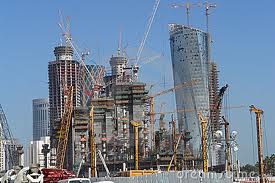By Andrew Warshaw
October 9 – Qatar’s 2022 World Cup organisers have angrily dismissed claims that the Saudi-led political and trade blockade of the Gulf state could see it stripped of hosting rights because of inability to complete essential infrastructure projects in time.
A controversial critical report, released just at the time Qatari officials were in London to flag up Doha’s famed Aspire sports academy on Friday and Saturday, claimed there was an “increasing political risk” that Qatar may not be able to host the tournament.
The report – entitled ‘Qatar in Focus: Is the Fifa World Cup 2022 in danger?’ – quoted “tournament insiders and regional experts” but did not name any sources or provide concrete evidence to back up its claims.
“Western diplomats have privately stated they do not know whether or not the tournament will take place as planned,” said the report drawn up by little-known management consultancy Conerstone Global. “The reasons for this are many and include open allegations of corruption – both in the (2022) bidding process and in the infrastructure development.
“Given the current political situation… it is certainly possible that the tournament will not be held in Qatar. Any cancellation of Qatar hosting the World Cup 2022 will likely be abrupt and will leave contractors involved in a precarious situation that may not be easily resolved.
“Construction sources in Qatar have informed us that companies working on the World Cup, whilst not panicking yet, are already feeling the impact of the sanctions, with logistics proving costly and challenging to re-organise in light of the border closures with its neighbours.”
Qatar 2022′s Supreme Committee for Delivery & Legacy immediately rebuked the claims saying that “there is absolutely no risk to the future of the first World Cup in the Middle East” and that there would be “no impact on preparations as a result of the ongoing and illegal blockade against Qatar.”
The timing of the report, which deflected attention away from the two-day Aspire4Sport conference and exhibition much to the irritation of organisers, raised inevitable questions about its motives and whether it was in some way orchestrated by Qatar’s neighbours who have cut off diplomatic and trade links over allegations that Qatar is supporting terrorism in the region.
“In the context of the current political situation we question the motives of an organisation – which makes no secret of its affiliation to the countries blockading Qatar – of publishing a report based entirely on media reports and anonymous sources,” the Supreme Committee added.
“The intention to create doubt regarding the tournament, while attempting to cause resentment amongst Qatari citizens and anxiety amongst foreign businesses and residents, is as transparent as it is laughable. Despite the ambitious title of this report, there is absolutely no risk to the future of the first World Cup in the Middle East.”
Qatar insists that since the blockade it has been able to find other suppliers for the materials needed to construct the eight stadiums that will be used for the World Cup.
“We have come under criticism and attack over the years, but we have always faced our critics,” Hassan al-Thawadi, Qatar’s World Cup chief, told Al Jazeera. “Our projects are going ahead as scheduled. This (blockade) is no risk in relation to the hosting of the World Cup.”
Cornerstone founder Ghanem Nuseibeh nevertheless insisted the report had not been aided by any of the governments opposed to Qatar. “The report has been done very objectively by people who have been to Qatar and have spoken to people on the ground there,” he told the Daily Telegraph. “There is no political motivation for that.”
In further comments attributed to him by other media organisations, Nuseibeh added: “No one in Saudi Arabia, the UAE or anywhere in the Gulf had any input at all – neither funding it [the report] nor commissioning it nor paying for it nor benefiting from it in any way at all, as far as I’m concerned. That is pure speculation [by Qatar]. No one outside of the UK and Europe had any input into that report or any interest in it.”
“The report was written based on extensive on the ground research, talking to people who are involved with it. The nature of political and economic risk reports is that you highlight problems rather than doing a PR exercise. They (the Qataris) haven’t commented on the actual findings, which I find actually confirms the suspicions or conclusions that we reached after almost three-and-a-half months of research.”
Contact the writer of this story at moc.l1751517947labto1751517947ofdlr1751517947owedi1751517947sni@w1751517947ahsra1751517947w.wer1751517947dna1751517947

